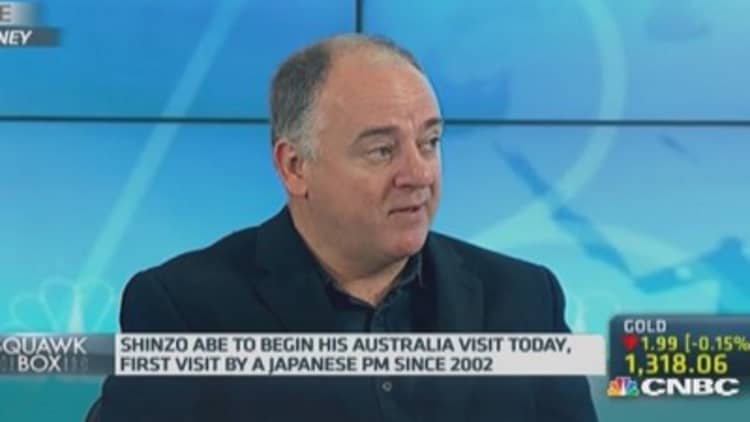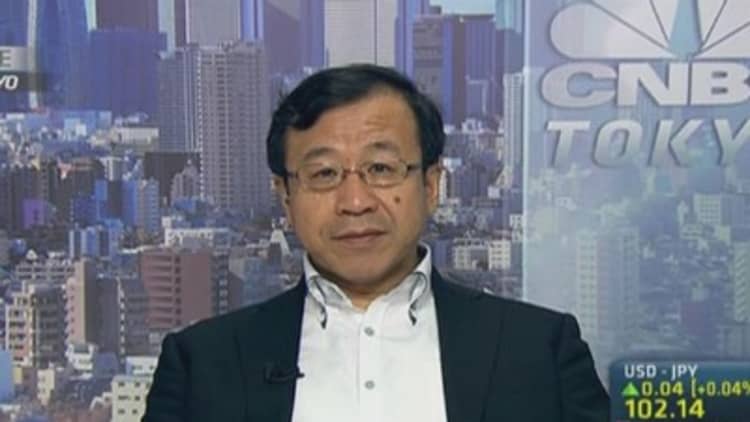
As Japanese Prime Minister Shinzo Abe's four-day visit to Australia begins on Monday, one country will be keeping extra close tabs on announcements coming out of the trip: China.
Abe's visit to Australia - the first by a Japanese prime minister since 2002 - comes days after the Japanese cabinet lifted a 60-year-old ban on "collective self-defense" to allow its military to aid allies such as Australia and the U.S. if they come under armed attack.
Read MoreJapan to drop ban on self-defense
"Japan is seeking deeper alliances as it is beset by Chinese confidence and assertiveness," Kerry Brown, director, China Studies Center at University of Sydney told CNBC, discussing Abe's agenda in Australia.
"China will watch any statements by Abe and Abbott that come out of the visit carefully. They will pay particular attention to the language used about the nature of Japan-Australia security relations, and any unity between the two on their approach to China," he said.
Preparing for a stronger China
China's growing military clout and assertiveness - particularly with regard to territorial claims in the East and South China Sea - has its neighbors on edge.
China lays claim to Japanese-administered islets in the East China Sea, known as Senkaku in Japanese and Diaoyu in Chinese. It also claims the South China Sea nearly in its entirety, rejecting rival claims from Vietnam, the Philippines, Taiwan, Malaysia and Brunei.
Read MoreHow to avoid an arms race in Asia: Shinzo Abe
"There will never be a better opportunity for Japan to reinforce the bilateral relationship with Australia in the context of the Asia-Pacific geopolitical/geo-economical ecosphere," said Jun Okumura, visiting scholar at Meiji Institute for Global Affairs.
"[Australian Prime Minister] Tony Abbott is a far more sympathetic figure for Japan than his Labor predecessors. Now is the time [for] Mr. Abe to turn this opportunity to substantive and lasting gains," said Okumura.

Trade ties
While deepening security ties will be top priority, bolstering economic relations will also be on the agenda, with the two leaders expected to sign the landmark Japan-Australia Economic Partnership Agreement (JAEPA) - a bilateral trade deal to lower import tariffs including a reduction of Japanese tariffs on Australian beef and an end to Australian duty on Japanese cars.
The JAEPA was first agreed in April when Abbott visited Japan; however it's yet to be rubber-stamped.
Read MoreIs a less pacifist-Japan on collision with China?
"China is so dominant in the economic relationship with Australia that it's becoming a concern [given] China's falling growth rate. I think at the back of Abbot's mind is Australia has to have a good framework with free trade agreements with South Korea and Japan - they are huge economic allies - so that they can have diversity and not be over reliant [on China]," said Brown.
Australia and Japan have mutual economic interests with Australia competing with other natural resource exporters for the Japanese market, and Japan competing with other manufacturing exporters for the Australian market.
Read MoreJapan to dropban on self-defense
Japan is Australia's second-largest export market after China and third-largest source of foreign investment.
Australia's exports to China were valued at $102 billion in 2013; double that of exports to Japan, which were valued at $50 billion, according to the Australian Bureau of Statistics.


